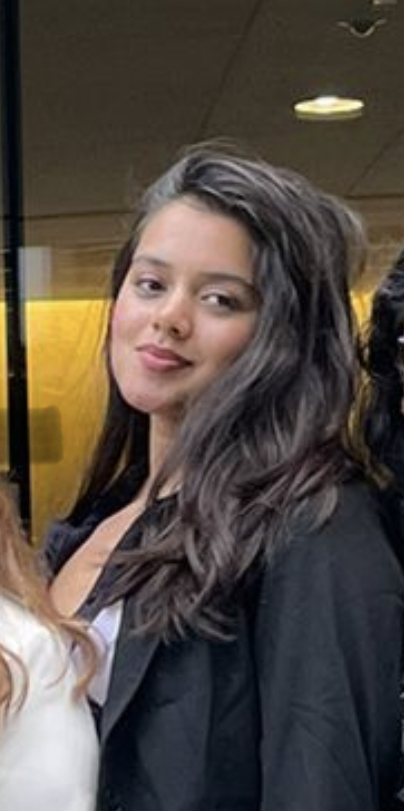
Undergraduate Commencement at Berkeley Haas. Photos Copyright Noah Berger / 2022.
All photos from 2022 MBA Commencement.
What is Business? The question can’t be answered by a dictionary definition, nor can it be condensed to a single person’s perspective. The Business realm is interdisciplinary in nature, personal and abstract and technical and intangible. So, what value do students gain from studying Business in college? Some critics claim that aspects of Business can either be intuitive or learned through experience and exposure. Today, I am interviewing Dr. Brandi Pearce, a faculty member at Haas, on her insights regarding a college education in Business and how it contributes to career.
Introduction
“I am Dr. Brandi Pearce and I’m on the faculty here at Berkeley-Haas. My core specialty is leading groups and teams.
In addition to teaching, I created and now oversee a curriculum called Teams@Haas that is integrated into all three of our MBA degree programs. [It] is designed to support leadership development as students work in their academic teams. It strives to empower students with knowledge, tools, methods, and techniques on how to effectively launch and develop a team over time. Students can then extract those learnings and apply them in different contexts, either here at Haas or in new teams across programs or even back in their workplaces.

Dr. Brandi Pearce
I designed and teach a series of courses on leading high-impact teams, allowing students to take a deep dive into the framework that underpins Teams@Haas. The goal of the course is to equip our students to think about the conditions needed for a team working on intellective tasks. [The] team is working to combine knowledge and information across diverse actors to create new products, solve complex problems, and/or make integrative decisions.
Additionally, I teach “Leading People,” which is part of our core undergraduate and graduate programs, and “Power and Politics,” which is a popular elective course. I spend a lot of time on campus, and I love working with all our students. I am really excited because, in 2024, we will launch our four-year Business Administration degree program for undergrads. I’m looking forward to ways that we can integrate our graduate and undergraduate populations to create an even more robust Berkeley-Haas ecosystem.”
Bhardwaj: In your perspective, what is the value of learning Business in a college setting?
Dr. Pearce: “I think this goes back to some of the things we’ve talked about in class. This is a “yes and” conversation. Learning can happen in lots of places and in many different ways. Academic institutions provide a unique sandbox for a particular kind of learning that is perhaps more difficult to achieve in an organizational setting where the primary goal is often centered around profit generation and/or execution. Universities are uniquely designed to give students time to step back, reflect, experiment, and grow in a context where the stakes aren’t as high, so there is more opportunity for experimentation and even failure.
I also think a strong business education is interdisciplinary. It creates an opportunity for students to pull threads from a lot of different domains. Business education provides an opportunity for students to build a strong quantitative and analytical toolkit, as well as the space to begin building their leadership portfolio. To consider “How can I be an effective leader inside of an organization or team?” and, “How might that change over time as my career evolves and I’m actually leading a team?” or, “What are the core capabilities or essential skills that I need to be an effective communicator?” [and], “How do I explore these ideas in a context where I’m working on multiple tasks, in different kinds of conditions, and with diverse actors?”
The third piece that is really unique about business education, particularly in a public institution, is that we are drawing students from all over the country and globe into one place. We inspire thought on how to solve some of the most complicated challenges we are facing globally and learn how to do that with people who have very different points of view, lived experiences, and may see a problem from a completely different perspective. Universities want students to understand and think about how to create capacity and belonging for all kinds of differences while orienting towards a shared outcome or purpose.
Our leadership principles at Berkeley-Haas serve to create a shared organizational culture that brings people together, no matter their background. Our Berkeley-Haas defining principles are a set of shared values that our students can relate to, and that can be enacted in various ways, whether it’s the research that you’re engaged in, a topic you are learning, or an identity that you’re connected to and curious about. Our defining principles frame how we think about leadership at Haas and support us in working toward a common understanding of what leadership might look like in a complex, diverse, and dynamic global economy. Our principles have become incredibly important to our students, faculty, staff, administrators, alumni, and the broader community.”

Ayushi Bhardwaj
Bhardwaj: In Business classes, students are taught about certain ideologies and approaches to work. Do you think these skills can be learned in the corporate world as well?
Dr. Pearce: “One of the unique things that is provided in business classes that are embedded in a university setting is that the knowledge and methods presented are research-informed. There is a lot of information that’s swirling around the world through the Internet and other channels. Some of it is vetted with evidence, and some of it is not. In fact, some of it moves into our common ethos, and we start to begin to believe that it’s accurate. It may be accurate in certain conditions, but I think that’s where a university can help us begin to understand the boundary conditions of particular phenomena.
For example, interviewing is a practice widely-used by organizations to select employees. University-based research has played a significant role in helping us understand the ways in which these practices can be biased and has played an important role in transporting best practices that are now used by many organizations. More recently, Laura Kray, a Berkeley-Haas professor right here in our own backyard, has shattered an outdated pay gap myth. In her research, she shows that contrary to popular belief, professional women now report negotiating their salaries more often than men, but they get turned down more often. Having access to this type of evidence-informed knowledge allows our emerging leaders to be on the frontier of what’s ahead and to create new research-based best practices and concepts in their organizations. Exposure to research in experiential classrooms helps students become critical thinkers who evaluate what information they are receiving while putting these ideas into action. They are equipped to consider whether information is grounded in evidence. What are the boundary conditions? Does it apply in all contexts and for all actors? And then, how does this impact the way I go out into the world and lead others?
I believe the ability to think critically and to collaborate effectively with others will become increasingly important with the advent of AI – a future in which leaders will have to become even more effective at vetting information, recognizing bias, and integrating the information gathered by AI technologies with others effectively to create new products, engage in effective decision-making and solve complex problems.”
Bhardwaj: What sort of advantage does a college education provide someone when they enter industry?
Dr. Pearce: “One of the things I observe at Berkeley is that a lot of students are double majoring or working on a Business degree in concert with a minor. These students are graduating with an amazing toolkit that allows them to add value to organizations very quickly, in terms of both their analytical skills and their ability to bring deep expertise in a particular domain. For example, I notice a lot of students double major in Business Administration in combination with Data Science, environmental science, psychology, or maybe a Liberal Arts subject. This enables students to be more informed when making decisions to bring different perspectives, to look at phenomena from different points of view, and to apply this interdisciplinary learning.
Additionally, students majoring in business administration are taking accounting, economics, finance, and marketing, along with essential skills like communication, and, ideally, a course on leading high-impact teams. At a large public university like Berkeley, students are doing this with other students from a variety of different lived experiences and backgrounds. In concert, this unique experience empowers our students to engage in organizational life in an informed way, not only in terms of their base of knowledge but also with more awareness of how their own actions impact others, particularly others who may be different than themselves. For example, a student might think, “Wow, I’m noticing there’s a member of this team who isn’t contributing.” In a moment like this, our students can refer back to their university experience, to value the importance of diverse perspectives, and then draw upon different strategies and tactics they have learned both implicitly and explicitly to pull everyone into the decision-making process. This results in greater self and other awareness at a very early stage of one’s career.
For me, I’m not sure I completely understood the importance of what I was learning when I was in college. Rather, it’s when I reflect back on my time in university, that I really realized what I had learned and what the value might have been – whether it’s the global network you’ve developed, the knowledge you hold, whether it’s the capability of thinking critically and working collaboratively, or the opportunity to learn with and through a diverse set of actors. I think those are things one starts to recognize as one moves through one’s career and examines one’s college experience in the rearview mirror.
It’s not uncommon that I get emails from students two or three years out, sometimes more, saying, ‘So many of the things that we reflected upon and discussed in class I’m now really having to put into practice, and it’s harder than it seems. I’m so grateful to have frameworks and some prior exposure to approach these moments that would otherwise feel so daunting.’”

Haas Undergraduate Classes.Photos Copyright Noah Berger / 2019.
Haas Undergraduate Program classes in Chou Hall. Kellie McElhaney. Todd Fitch. March 2019.
Bhardwaj: If you were to choose a second major along with Business, which one would you pick?
Dr. Pearce: “I was an Econ major as an undergrad, but I was always fascinated by psychology. If I were to do it again, I would probably do a Business degree, in concert with Psychology. I would also add something related to data science so that I could really understand how to best organize and leverage big data. I think big data, if it hasn’t already, will become another actor that teams will have to collaborate with to make decisions. If I had to pick only one major, it would be Cognitive Science. It is an interdisciplinary field that provides students with different points of view on phenomena integrating neuroscience, psychology, anthropology, etc.”
Bhardwaj: Did you notice any disconnects between Business education and the corporate world?
Dr. Pearce: “There’s always a learning curve as one transitions from a university environment into one’s first role in an organization. In part because the accountability structure changes and the nature of what you’re working on changes. In a university environment, there is a certain level of fluidity to tasks and less ambiguity. There’s an infrastructure around a syllabus that says, “Here’s what we’re going to cover over the next 15 weeks, and here’s how you’ll be evaluated.” Your syllabus clearly articulates the metrics of success.
As you move out into the world, the nature of what you’re working on is often much more ambiguous. How success is evaluated varies depending on what industry you’re in, who you report to, and what role you play in an organization. However, many of the capacities developed in a university begin to apply – for example, being effective at exploring ideas, thinking critically, continuing to build self-awareness, taking perspective, and leading beyond authority. These are all capabilities that students have in their toolkits that translate. For me, when I started my first job, I felt equipped with knowledge; the transition, however, was more about becoming comfortable in a new environment and with the new rhythm of how I spent my time. As with all of my career transitions, I had to find a new balance and re-establish my values and priorities.
The transition from college to organizational life may be similar to when one moves from high school to university. All of a sudden, the environment seems so much bigger, ambiguous, and unclear because it is new. This time, however, hopefully, university life has equipped you with new tools and capabilities that will support you in making the leap even more effectively. Before you know it, it’s my hope for our students that organizational life will feel familiar and comfortable, but also challenging and engaging – a place where you will not only contribute but will also continue to learn and feel a sense of belonging! A place to be a student always, go beyond yourself, question the status quo, and engage with confidence without attitude!”
Ayushi’s Bio
Ayushi Bhardwaj is a junior at the University of California, Berkeley (fondly known as “Cal”), where she is studying Business Administration with a Global Concentration, along with Cognitive Science. She is interested in consumer psychology and marketing, and aims to work in consulting on an international scale. Ayushi dreams to fuse empathy and strategy in her life trajectory, uplifting the world with intentionality.
You can often find her editing articles for the Haas Undergraduate Blog, jotting down the random entrepreneurial ideas in her mind, snacking on quirky Trader Joe’s delicacies, or scrolling through way too many photos of her dog, Joey.











Questions about this article? Email us or leave a comment below.